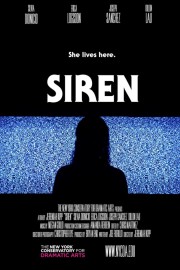Siren (Short) (Review by Phil Fasso)
I’ve reviewed a number of Jeremiah Kipp’s films across the years, and having done so, I’ve come to appreciate a number of his skills as an artist. The images and camerawork are almost always beautiful, even when he’s capturing things that are deeply disturbing; the storytelling thru the visuals elevates the plot elements; the conflict can be external or internal, but either way builds with a dread in every frame; often, human connections are broken, and the family unit is fractured. Once again, Kipp manages to work all his strengths into a mere 13 minutes in his latest short, Siren.
The establishing shot is a low angle of a house in the night. The angle, lighting and paced camera movement all indicate that something sinister is in the works, all punctuated by an eerie, ethereal woman’s singing. The camera prowls around the living room, passing a table full of liquor bottles in various states of emptiness, and settles on a desperate looking man in a lounge chair. Bathed in the light of the static coming from the TV, the distraught man calls his daughter and tells her not to come to the house. He puts the phone down without hanging it up, and promptly walks off with a handgun and shoots himself. But something peculiar happens just before he squeezes the trigger and ends himself: the silhouette of a woman stands before the TV.
Who is this woman? Why is the father distraught to the edge of suicide? How will the daughter he called react when she, her boyfriend and her brother come to the house to pick up the pieces? And how does this all apply to Greek mythology and Homer’s epic poem, The Odyssey? Working from a script from Joseph Fiorillo, Kipp answers all these questions brilliantly, with that deeply disturbing beauty for which any follower knows his works.
One of the most appealing pieces is how Siren looks at fractured relationships. When Kelli arrives at her father’s house, she tells her boyfriend Mark she hasn’t been to the house in years, and that it wasn’t nice to see him. I never find out what the particulars of the fracture were (though the copious amounts of booze make a strong suggestion), but Kelli still harbors familial feelings, as is evident when she tells Mark they can’t sleep in the same bed under Dad’s roof. Keep in mind that Dad is dead, and an uneasiness pervades these exchanges over an undercurrent of dread.
Two others join the scene in the forms of Kelli’s brother Jim and a mysterious young lady named Lucinda. When Lucinda refuses to leave the house, the other three are unsettled. This brings up a strange set of emotions, and confusion, in the wake of Dad’s death. But if you know your Greek mythology (and if you don’t, look up where the word “siren” originated), you understand that this will come to a grim conclusion. And in Kipp’s masterful hands, it does so with aplomb.
There’s very little negative to say about Siren, outside of a few of the performances. As Mark, Joseph Sanchez doesn’t emote enough, and I never really know how he feels about his relationship with Kelli. Erica Logsdon is adequate as Kelli, though again, I couldn’t really figure out from the performance how she felt about her dad’s death, or why. But Silvia Dionicio equals the playing field as Lucinda. Her character is something otherworldly, and she sells the mystery and danger of Lucinda perfectly.
Jeremiah Kipp ties this family drama together with all the tools in his skillset that make him a great director. As is always the case when I watch his works, Siren challenged me on several layers. The ambition alone to combine a modern day fractured family with a creature straight out of Homer was enough to intrigue me; the film itself satisfied as Kipp’s work dependably does.










